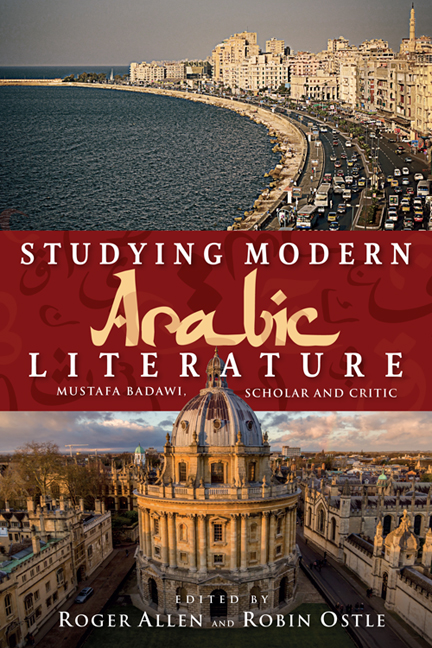Book contents
- Frontmatter
- Contents
- List of Figures
- Introduction
- Part I Alexandria to Oxford
- Part II The Academic Legacy
- 5 Beginning and End: Exploring the Qur'anic ‘Grand Story’
- 6 Modern Arabic Literature as Seen in the Late Nineteenth Century: Jurji Murqus's Contribution to Korsh and Kirpichnikov's Vseobshchaya Istoria Literatury
- 7 The ‘Second Journey’ (Al-Rihla al-thaniya) of Muhammad al-Muwaylihi's Hadith 'Isa Ibn Hisham Revisited
- 8 Ataturk Becomes 'Antar: Nationalist-vernacular Politics and Epic Heroism in 1920s Egypt
- 9 Jewish Arabs in the Israeli Asylum: A Literary Reflection
- 10 Strange Incidents from History: Youssef Rakha and his Sultan's Seal
- 11 Towards a Comparative Approach to Arabic Literature
- 12 Does Literature Matter? The Relationship between Literature and Politics in Revolutionary Egypt
- Notes on the Contributors
- Index
11 - Towards a Comparative Approach to Arabic Literature
from Part II - The Academic Legacy
Published online by Cambridge University Press: 05 August 2016
- Frontmatter
- Contents
- List of Figures
- Introduction
- Part I Alexandria to Oxford
- Part II The Academic Legacy
- 5 Beginning and End: Exploring the Qur'anic ‘Grand Story’
- 6 Modern Arabic Literature as Seen in the Late Nineteenth Century: Jurji Murqus's Contribution to Korsh and Kirpichnikov's Vseobshchaya Istoria Literatury
- 7 The ‘Second Journey’ (Al-Rihla al-thaniya) of Muhammad al-Muwaylihi's Hadith 'Isa Ibn Hisham Revisited
- 8 Ataturk Becomes 'Antar: Nationalist-vernacular Politics and Epic Heroism in 1920s Egypt
- 9 Jewish Arabs in the Israeli Asylum: A Literary Reflection
- 10 Strange Incidents from History: Youssef Rakha and his Sultan's Seal
- 11 Towards a Comparative Approach to Arabic Literature
- 12 Does Literature Matter? The Relationship between Literature and Politics in Revolutionary Egypt
- Notes on the Contributors
- Index
Summary
Introducing his contribution to the Blackwell Companion to Comparative Literature, entitled ‘Comparison, World Literature, and the Common Denominator’, Professor Haun Saussey, the former President of the American Comparative Literature Association (2009–11), and the author of the Association's Report on the State of the Discipline, 2004, which appeared later in book form, edited and introduced by him under the title: Comparative Literature in an Age of Globalization (2006), writes:
I think the job of the comparatist is to invent new relations among literary works (and relations with things that have not been previously classed among literary works).
Bearing in mind this suggestion from a distinguished authority on comparative literature, students of Arabic literature, if they ever thought of studying this literature comparatively, might wonder if they need to look for relations between Arabic literature and other world literatures, and whether, if they do not find them, they need to invent such relations. Fortunately, the student of Arabic literature has no need to look too hard for such links, let alone to invent them, for they are as old as Arabic literature itself.
In the first place, Arabic literature's relations with other literatures of the world go back to pre-Islamic times, if not earlier, when the Arabs of the Peninsula were in close contact with the various surrounding nations and empires. Their relationships with their neighbours were not only commercial but also political, military, social and cultural. One aspect of the outcome of these ties is reflected in the many foreign words which permeated the Arabic language from Aramaic, Syriac, Greek, Latin, Persian, Amharic, Ethiopic and other languages of the Ancient Near East. It is enough to refer in this context to the foreign vocabularies in the Qur͗an, the claimed linguistic miracle of the Prophet Muhammad which the eloquent Arabs were challenged and failed to imitate. ‘Language’, as Rene Wellek rightly states, ‘is the material of literature as stone or bronze is of sculpture, paint of pictures, or sounds of music. But one should realize that language is no mere inert matter like stone but is itself a creation of man and is thus charged with the cultural heritage of a linguistic group.’
- Type
- Chapter
- Information
- Studying Modern Arabic LiteratureMustafa Badawi, Scholar and Critic, pp. 178 - 193Publisher: Edinburgh University PressPrint publication year: 2015

